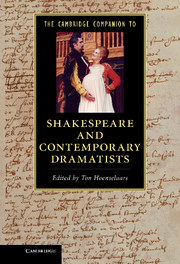Book contents
- Frontmatter
- Contents
- Illustrations
- Contributors
- Preface
- Chronology of the life and work of Shakespeare and contemporary dramatists
- 1 John Lyly and the University Wits
- 2 Thomas Kyd and the Elizabethan blockbuster
- 3 ‘The words of Mercury’
- 4 The dyer’s hand
- 5 Urbane John Marston
- 6 Thomas Dekker and the emergence of city comedy
- 7 Shakespeare
- 8 Thomas Heywood
- 9 George Chapman’s learned drama
- 10 Francis Beaumont and John Fletcher’s tragicomedy as musical melodrama
- 11 Thomas Middleton and the early modern theatre
- 12 John Webster
- 13 John Ford
- 14 Philip Massinger
- 15 Richard Brome and the idea of a Caroline theatre
- 16 Troublesome histories
- Select bibliography
- Index
- References
5 - Urbane John Marston
Obscenity, playfulness, co-operation
Published online by Cambridge University Press: 05 December 2012
- Frontmatter
- Contents
- Illustrations
- Contributors
- Preface
- Chronology of the life and work of Shakespeare and contemporary dramatists
- 1 John Lyly and the University Wits
- 2 Thomas Kyd and the Elizabethan blockbuster
- 3 ‘The words of Mercury’
- 4 The dyer’s hand
- 5 Urbane John Marston
- 6 Thomas Dekker and the emergence of city comedy
- 7 Shakespeare
- 8 Thomas Heywood
- 9 George Chapman’s learned drama
- 10 Francis Beaumont and John Fletcher’s tragicomedy as musical melodrama
- 11 Thomas Middleton and the early modern theatre
- 12 John Webster
- 13 John Ford
- 14 Philip Massinger
- 15 Richard Brome and the idea of a Caroline theatre
- 16 Troublesome histories
- Select bibliography
- Index
- References
Summary
The work of John Marston (1576–1634) has often been treated as if it possessed an almost solipsistic independence from and antagonism to, not just the dramatic establishment of his day, but the world at large. Marston is best known for a hostile attitude to an audience exemplified by the narrator’s declaration, in Certain Satires, that he will only write in the hope of causing offence:
If thys displease the worlds wrong-iudging sight,
It glads my soule, and in some better spright
I’le write againe. But if that this doe please,
Hence, hence, Satyrick Muse, take endlesse ease.
This hostility is further exemplified by The Scourge of Villainy (1598), dedicated ‘To everlasting oblivion’, by the dedication of Antonio and Mellida (1602) to ‘the most honorably renowned No-body’, and by the contemporary description of Marston himself in The Parnassus Plays as ‘Monsieur Kinsayder, lifting up [his] leg and pissing against the world’. Such comments have set the tone for much of Marston’s critical history. And yet, as writer, collaborator and theatrical shareholder, the ‘real’ Marston had complex constructive links to the theatrical culture of his day. Indeed, he also wrote for that most public, decorous and community-conscious of forms, the City of London civic entertainment. While aggressive hostility to all and sundry is undeniably part of the persona of what one might call the Marston brand, the factual reality is more complex, as this chapter will explore.
- Type
- Chapter
- Information
- Publisher: Cambridge University PressPrint publication year: 2012
References
- 1
- Cited by

